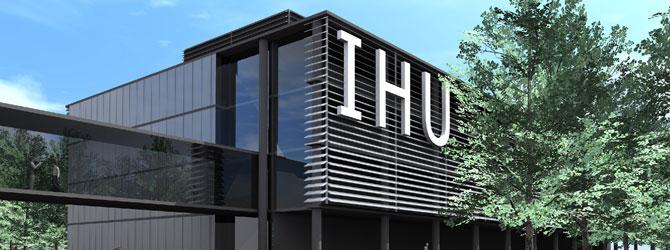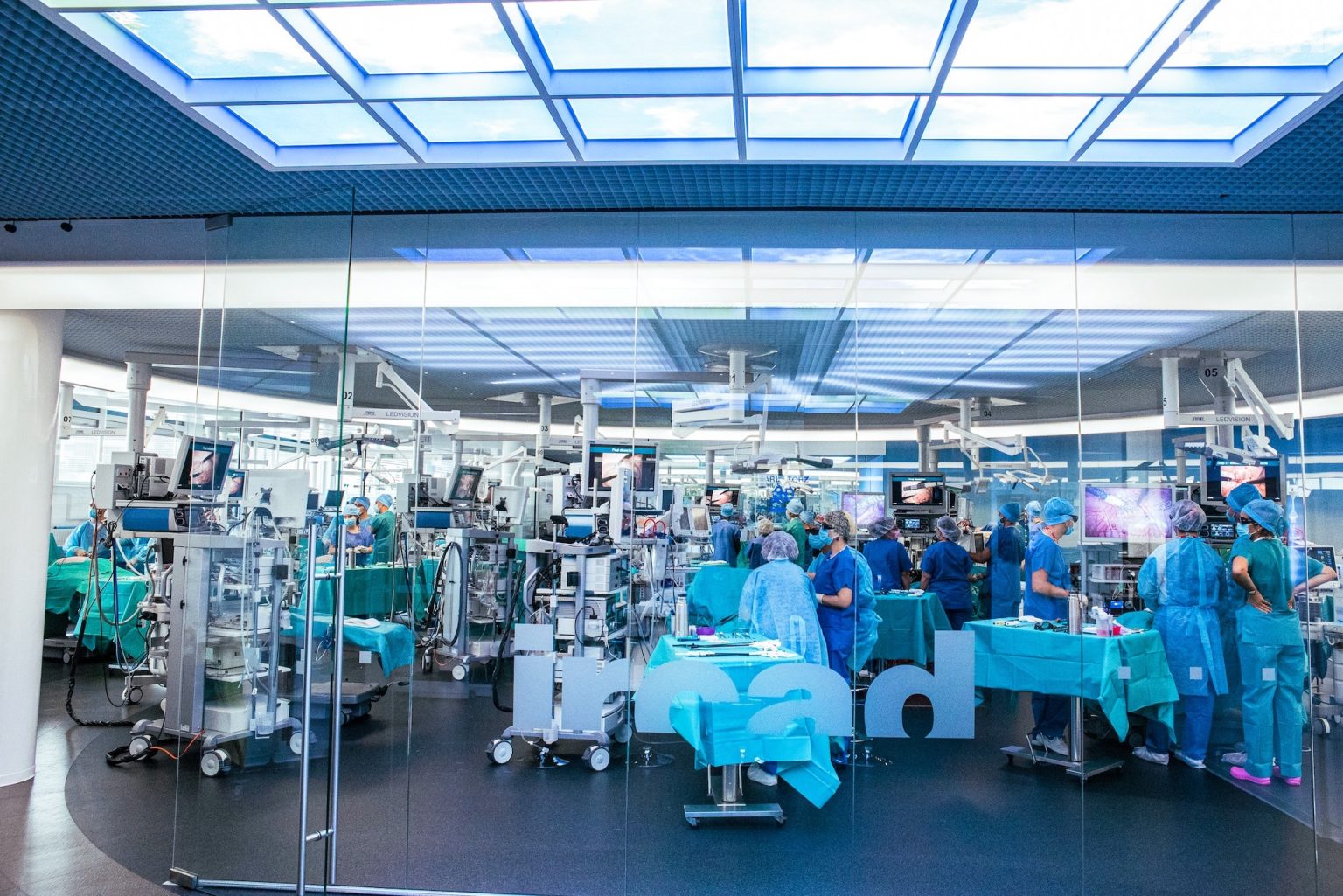
[video_ircad_playlist playlist='{“file”:”20110331_IHU”,”lang”:”en”,”title”:”Presentation”,”image”:”https://2017.ircad.fr/wp-content/uploads/2014/07/video_.jpg”}, {“file”:”20110331_IHU_beretz”,”folder”:”20110331_IHU”,”hd”:”1″,”title”:”A. Beretz”}, {“file”:”20110331_IHU_guillot”,”folder”:”20110331_IHU”,”hd”:”1″,”title”:”P. Guillot”}, {“file”:”20110331_IHU_carboni”,”folder”:”20110331_IHU”,”hd”:”1″,”title”:”N. Carboni”}, {“file”:”20110331_IHU_bigot”,”folder”:”20110331_IHU”,”hd”:”1″,”title”:”J. Bigot”}, {“file”:”20110331_IHU_ries”,”folder”:”20110331_IHU”,”hd”:”1″,”title”:”R. Ries”}, {“file”:”20110331_IHU_bisch”,”folder”:”20110331_IHU”,”hd”:”1″,”title”:”P.-E. Bisch”}, {“file”:”20110331_IHU_richert”,”folder”:”20110331_IHU”,”hd”:”1″,”title”:”P. Richert”}’ credits=”IRCAD”]
The IHU Strasbourg will lead the next evolution of medical procedures to Image-Guided Minimally Invasive Hybrid Surgery (MIX-Surg). Recent decades saw amazing progress in medicine as minimal access procedures replaced radical surgical resections. Unfortunately, minimally invasive techniques were developed by separate and distinct specialties and are inevitably limited by the expertise of individual specialists such as surgeons, radiologists and gastroenterologists. The IHU will combine the best aspects of minimally invasive techniques from separate specialties to create optimal hybrid approaches for improved patient care and quality of life. The IHU will then enhance hybrid approaches through cutting-edge research, develop the next generation of medical devices and train the physicians of the future. Initially, the IHU will focus on abdominal diseases, which represent a large percentage of worldwide illness. After proof of concept in abdominal diseases, the IHU will expand its scope by developing hybrid approaches in other medical disciplines. The building blocks of success for the IHU Strasbourg are as follows.
Strasbourg played a significant role in the revolution from open to laparoscopic and robotic surgery, which led to measurable benefits in patient care and quality of life. IRCAD, founded at the University of Strasbourg Hospital by Prof. Jacques Marescaux, is recognized worldwide as a preeminent center for laparoscopic surgical research and training. Over 4,000 surgeons from 92 countries attend training courses in Strasbourg annually. The successful formula and increasing demand for training has driven the creation of international sites in Asia and Latin America. Moreover, IRCAD created WeBSurg.com, the top web-based surgical university with over 200,000 members. Finally, it produces innovative research in minimally invasive surgery with a track record of multidisciplinary teams transferring technology for the benefit of patients through public-private collaboration (19 Industry Partners). Leveraging IRCAD and the University of Strasbourg’s experience in guiding laparoscopic surgery will be a key advantage for the IHU in driving the future of MIX-Surg.

The promise of developing new medical procedures and open new healthcare markets will allow to attract international thought leaders in medicine and engineering, and it will enable to partner with developing and established industry leaders. The IHU has provisional faculty commitments from the following thought leaders in medicine: L. Swanström (USA), T. Ponchon (FR), C. Ell (DE), P. Koninckx (B). Many companies share the IHU’s vision of creating hybrid operation based on minimally invasive surgery enabled by sophisticated imaging, computer assistance, robotics and advanced telecommunications. To date, 33 industry partners have committed to the IHU, including Siemens Healthcare (DE), Karl STORZ Endoskope (DE), Orange (FR), Thales (FR), ALTRAN (FR), Edap-TMS (FR)…
The IHU will bring together research and development labs with leaders in science, engineering and clinical practice whose work will directly impact MIX-Surg. The focus of research and development will be on patient-specific computer-assisted surgery, including medical imaging processing, biological modeling, targeted therapies, robotics, and hybrid medical device development. The IHU is dedicated to the clinical transfer of technology with the goal of bringing new ideas and procedures rapidly to the patient benefit of the healthcare system. This R&D initiative will inevitably attract a variety of entrepreneurial start-ups that will accelerate progress in the field of MIX-Surg. To facilitate technology transfer, the IHU will include a full time staff dedicated to Intellectual Property, technology licensing and business development so that promising projects will have the greatest chance of reaching patients.
The evolution of surgery to incorporate image guidance, computer assistance, robotic augmentation and telecommunications will require a paradigm shift in the training of physicians, engineers, and other healthcare workers. The classic boundaries between medical, surgical and radiological disciplines must be reorganized to produce multidisciplinary teams who are proficient in all tools relevant to patients. The IHU will lead a broad effort to remodel training in healthcare and engineering to create the future leaders of MIX-Surg.

The IHU is aligned with regional initiatives that identify medical technology as the most promising sector for local economic growth. The international market for minimally invasive hybrid procedures is estimated to grow at a mean annual rate of 8% to reach €37 billion in 2014. Unfortunately the market for minimally invasive technology does not have a single major French company despite the origin of many of these technologies in France. To fill this void, the IHU will partner with local authorities to develop a 5-hectar medical technology campus. The IHU Strasbourg could lead the creation of up to 2,000 new jobs, 10 industry R&D centers, and 40 small businesses over ten years, based on a joint assessment with McKinsey and Company. A Board of Trustees that includes political, investment and industry leaders will guide the business development of IHU initiatives.
The IHU will form a dedicated impact analysis committee constituted by experts in health economics and business. This committee will analyze all IHU initiatives for both their impact on health outcomes and their commercial viability. The ultimate goal is to develop cost-effective procedures that succeed in the market by improving medical outcomes and patient’s quality of life.
The investment in the IHU Strasbourg is expected to improve the practice of medicine, to serve as a platform for healthcare innovation and technology transfer, and to establish the presence of France in the international medical device industry.

Please note that the IRCAD administrative board and staff are closely monitoring the evolving COVID-19 situation, in full compliance with all applicable laws and regulations in France. The health, safety, and well-being of our participants, experts and staff are our top priority!
Despite the current context, the IRCAD stands firmly by your side to help you acquire knowledge and skills. Come and join us !
We would like to draw your attention that the « Vaccine Pass » is now mandatory in France since end of January 2022 and replaces the former « Health Pass » to access places that are open to the public, such as cinemas, museums, cafés and restaurants, hotels as well as the IRCAD Institute which welcomes participants in the framework of its courses and seminars. Thus, a PCR test without vaccination is no longer sufficient to take part in our courses.
The vaccine pass includes a proof of the following (one of the 3 items is sufficient):
Further information about the new vaccine pass can be found at :
We very much hope to be able to count on your kind understanding of those rules which have been set by the French Government and which our Institute is required to apply